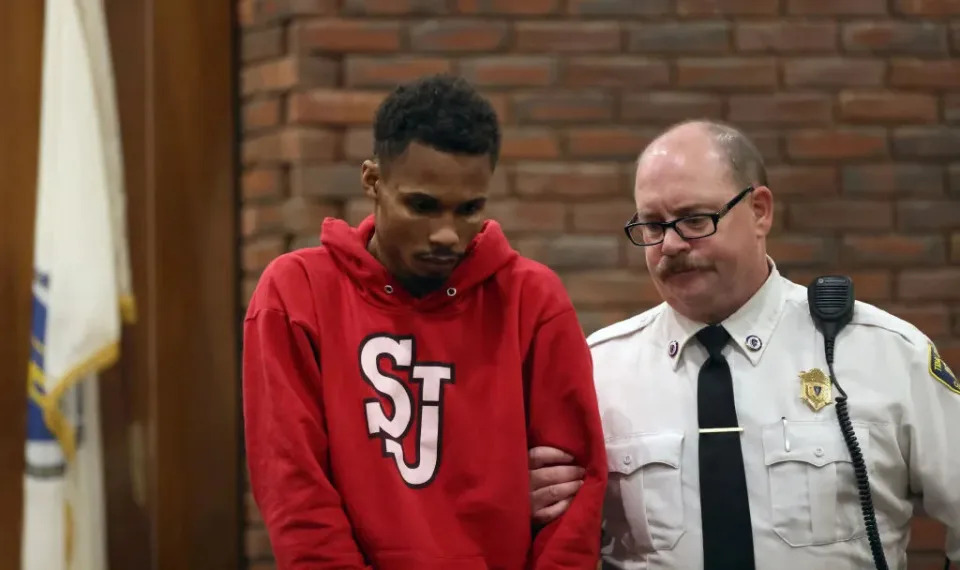Republicans say Biden's America is awash in immigrant-driven crime. What do the data say?
Kevin Rector
Wed, July 17, 2024

Sen. Ted Cruz (R-Texas) speaks during the Republican National Convention in Milwaukee on July 16, 2024. (Robert Gauthier / Los Angeles Times). [This idiot from Texas lies through his racist nose: In Cruz’s home state of Texas, undocumented immigrants were 26% less likely than native-born Americans to be convicted of homicide, according to the Cato Institute. Those numbers were even lower for immigrants with legal status].
One after another, Republican leaders painted a dire picture of America from the Republican National Convention stage in Milwaukee on Tuesday, suggesting the nation is awash in violent crime driven by an "invasion" of "illegal aliens" and "Chinese fentanyl" at the southern border.
Echoing many of the evening's other speakers, House Speaker Mike Johnson of Louisiana said Republicans were the "law-and-order team," while President Biden and Democrats intent on a "borderless, lawless" future were responsible for "dramatic increases" in violence and drugs in the country.
Sen. Ted Cruz of Texas said that "every damn day," Americans are killed and raped by illegal immigrants that Democrats let into the country. "Every damn day," the crowd chanted back in a chorus.
The crime picture in the United States is much more nuanced than suggested, according to federal and state data, which vary across the country and from city to city.
For example, Los Angeles officials in January touted a large drop in violent crime in 2023, compared with the year prior — with killings down 17% and shootings down 10%, according to Los Angeles police data.
But just last month, Gov. Gavin Newsom said he would quadruple the number of California Highway Patrol shifts in Oakland, where city data last year showed violent crime had increased 21%, robbery by 38% and vehicle theft 43%.
The clearest recent trend in national crime data — which Democrats have cited to rebut the Republican claims and which Republicans dismiss as misleading — is that violent crime is down.
Jeff Asher, a crime analyst and co-founder of AH Datalytics, has studied national crime trends for years. In an interview with The Times, he said the Republican talking points about rising violent crime "would have been better in 2021 and 2022 than they are in 2023 and 2024."
Violent crime — including homicides — did increase, and substantially, in those earlier years [at the end of Trump's term] amid the social upheaval associated with the COVID-19 pandemic. However, Asher said there has been a clear decline in the two most recent years [2022 and 2023 under Biden's term], according to available federal data and state-by-state figures he has gathered.
"All of the data we have points to — especially in regards to murder — a really large decline last year [2023]," Asher said, and "so far this year [2024] an even larger decline."
The declines are "not everywhere, but across a large swath of American cities," and "to, in some places, pre-COVID levels," he said.
"Reasonable people can disagree on who's to credit for it, what's the cause, what policies are working, what policies aren't working, where is it coincidental," Asher said. "The evidence of declining gun violence and murder in the U.S. [during the Biden presidency], though, is incontrovertible."
Declines in both blue and red states are contributing to the improved picture nationwide, Asher said.
California saw 1,892 homicides reported in 2023, which was "roughly in line" with annual figures seen from 2016 to 2019 — and well below the state's historic high for homicides and its levels during the peak of the pandemic.
In 1992, the city of Los Angeles alone saw 1,092 homicides. In 2022, there were 392. In 2023, there were 327.
In 2019, there were 253 homicides in L.A., so the recent decline has still not brought the city back to its pre-COVID levels of violence.
As for crime by immigrants, Cruz and others cited a handful of specific cases to bolster the claim that such incidents are common. Again, the data suggest a more nuanced picture.
Ran Abramitzky, a Stanford University economics professor, helped lead a nationally representative study of incarceration rates for immigrants and U.S.-born citizens from 1870 to 2020. The study included all immigrants, not only those in the country illegally.
It found, Abramitzky said in an email to The Times, that "as a group, immigrants have had lower incarceration rates than the US-born for 150 years."
It also found that "relative to the US-born, immigrants' incarceration rates have declined since 1960," and "immigrants today are 60% less likely to be incarcerated" — and "30% less likely even relative to US-born whites." That was true for immigrants from all regions, he said.
Abramitzky said he has also studied political rhetoric surrounding immigration, analyzing "200,000 congressional speeches and 5,000 presidential speeches since 1880."
That research, he said, found that "attitudes towards immigrants in congressional speeches have overall improved over the last few decades, but they also become increasingly more polarized by political party.
"Democrats are increasingly more positive and pointing to immigrants' contributions to the U.S.," Abramitzky continued, "and Republicans remain negative and increasingly focus on issues of crime and legality when they talk about immigrants."
Data show fentanyl deaths in the U.S. did increase under Biden. But they also increased under then-President Trump.
The Centers for Disease Control and Prevention reported in May that U.S. drug overdoses, including from fentanyl, decreased in 2023 for the first time since 2018. Deaths attributed to fentanyl specifically decreased to 74,702 in 2023 from 76,226 in 2022.

